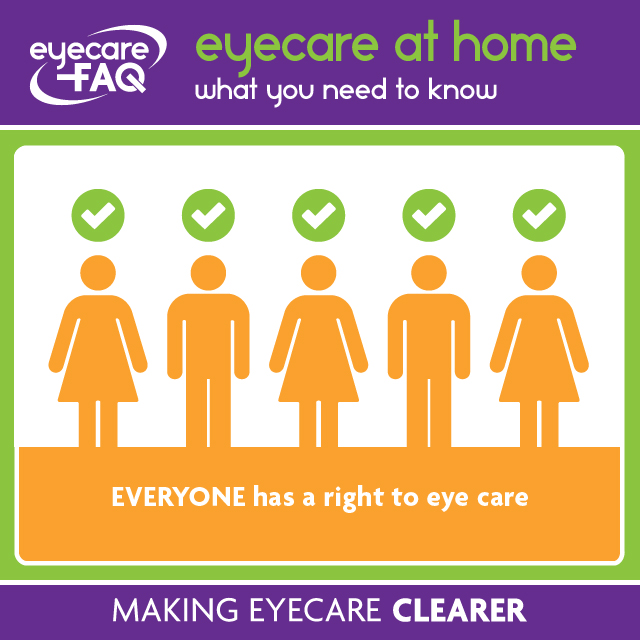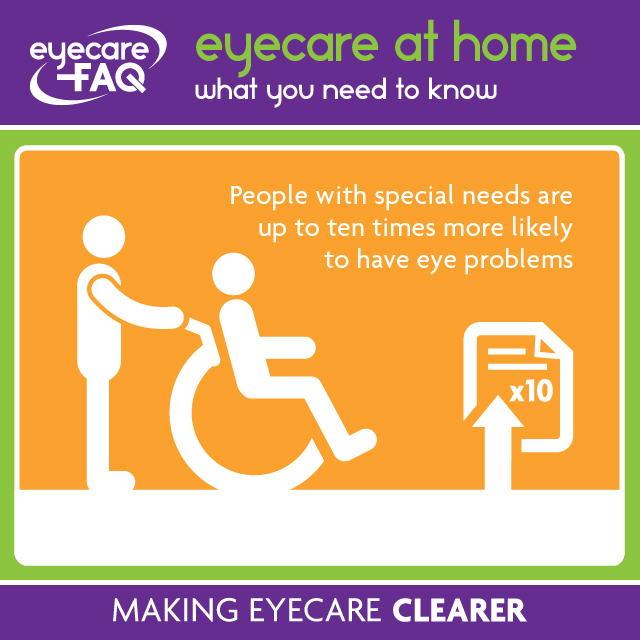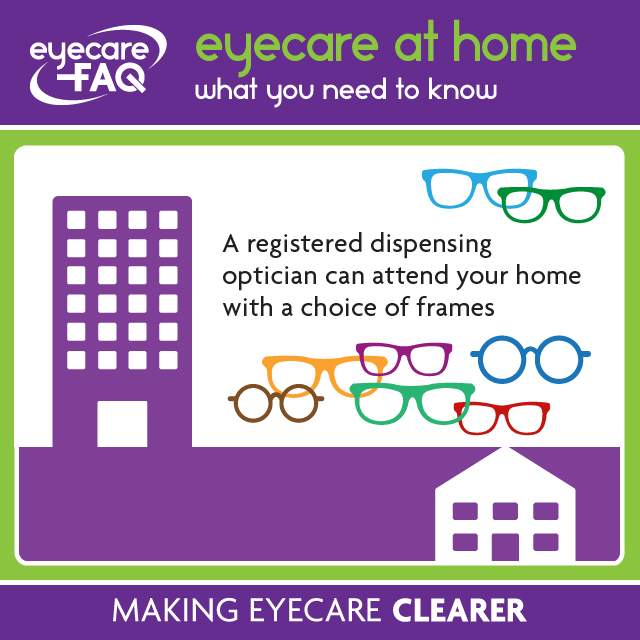I care for my housebound mother and her eye sight is getting worse, but isn’t that an inevitable part of aging?
There are many conditions that cause vision to deteriorate with age, and most of them can be treated. Poor vision can lead to falls, and it may make it harder for people to socialise and enjoy hobbies. People who are housebound can still have an eye test and spectacles dispensed in the home – search for ‘domiciliary eye care’ in your area to find local providers.
Why do people in residential care need eye tests?
A eye test is a vital health check for anyone. It can get overlooked, especially if people are unable to explain that they have problems with their eyes. People with special needs are up to ten times more likely to have eye problems. And many eye problems become more likely as we get older. Even if you are unsure if someone will benefit from an eye test, speak to your local optical practice for advice. Some practices specialise in bring eye care to your home or a residential care setting, and can make looking after everyone’s eyes a positive experience.
I work in a care home. It is difficult to take residents for eye tests – what else can we do?
People who are housebound can still have an eye test and spectacles dispensed in the home – search for ‘domiciliary eye care’ in your area to find local providers. Some practices specialise in bring eye care to your home or a residential care setting, and can make looking after everyone’s eyes a positive experience.
I care for someone who doesn’t communicate verbally – how can an eye test work for them?
Eye tests are tailored to the needs of the individual. They do not rely on the person’s communication; people who have, for instance, had a stroke or have learning disabilities can still have an effective eye test. The optometrist can look at the person’s eyes and assess if they are long or short sighted. They can check inside the eyes for signs of eye disease. Some optometrists offer specialist services or may be able to use Makaton.
Why does everyone need an eye test, however old or disabled they are?
Good vision can have a positive impact on a person’s independence and general well-being, and can also help to prevent falls. Age is a risk factor for developing glaucoma. This eye condition usually causes no symptoms in the early stages but if untreated may lead to significant loss of vision. Glaucoma may be picked up during a routine sight test. A sight test may also detect changes in the eye due to cataract, macular degeneration, and diabetic retinopathy, as well as other health problems such as raised blood pressure.
I care for someone who can’t get out: can they have an eye examination at home?
A domiciliary sight test is an eye test that takes place in your normal place of residence or a day centre. Optometrists who provide domiciliary services are experienced in examining people who have disabilities, and those who have limited communication or concentration. They can adapt the sight test accordingly. They will bring portable versions of the essential equipment used for a sight test in a high street practice.
Do I need to pay for eyecare at home?
Anyone who is eligible for an NHS sight test but cannot get to a high street practice because of a mental or physical disability can have an eye test at home funded by the NHS. Eye tests are provided by the NHS in England, Wales and Northern Ireland for various groups of people including those who are aged 60 and over. In Scotland NHS eye examinations are funded by NHS Scotland for everyone. A full list of eligible groups is available on the NHS Choices website www.nhs.uk for England and Wales. For Scotland visit www.scotland.gov.uk and Business Services Organisation in Northern Ireland www.hscbusiness.hscni.net.
NHS-funded eye tests are also provided for those in receipt of some means-tested benefits such as Income Support and Pension Credit guarantee credit. Those who are on low income, such as Pension Credit guarantee credit may also qualify for help towards the cost of spectacles. Leaflet HC11 ‘Help with Health Costs’, available from GP surgeries, dentists and optical practices, provides further information.
How often can I have an eye test at home?
Sight tests are normally recommended at least every two years but may be more frequent depending upon an individual’s circumstances. The optometrist will give advice on how frequently the individual should have their sight tested. You can ask for an NHS-funded sight test more often if they have symptoms or concerns that indicate that a test is necessary.
How do I book an appointment for an eye test at home?
The person or, if appropriate, a relative or main carer must request a domiciliary sight test. They may want to contact their regular optical practice to request a home visit. Many optical practices offer this facility. The person must be given free choice about which practice they use. If you have difficulty in finding someone to provide an eye test, either contact your local NHS organisation or call:
How long should it take before I can get an eye test at home?
Before providing an eye test in your home the optometrist has to give notice to the NHS, giving them the person’s name, address and date of birth, the date of their last eye test and the date and time of the proposed eye test. The notice must be at least 48 hours for one or two people at the same place, and three weeks for three people or more. If you are arranging eye care for a number of people in a residential setting this may cause a short delay when booking an eye test. In Scotland at least one month’s notification is required when three or more people are to be visited at the same address. In Northern Ireland notification must be at least 48 hours before the sight test except for urgent situations, when no notification is required.
What information will the optician need when they do an eye test?
It is extremely helpful to have the following information available. If you care for someone, try to find out:
- The date of the person’s last eye test
- Their previous prescription – this may be written down or their previous optical practice will have this. If neither of those is possible, the optician may be able to examine their specs to find the prescription.
- When the person wears specs and what for. (Bring all pairs of specs to the test)
- Whether the person is having any problems with their eyes or their vision.
- Whether the person has ever been to hospital because of their eyes, and whether their close family has eye problems.
- The person’s medical history and that of their close family.
- Any medication that the person is taking.
If you work with or care for someone with learning difficulties, and you are taking them for their first eye examination, check out SeeAbility’s resources to help you prepare for an eye test.
We have booked for an optician to visit and do an eye test. What sort of room will they need?
Where possible, an eye test should take place in a room which has good lighting, and blinds or curtains which allow the room to be darkened when needed. Ideally, there should be three metres of space in front of the person’s chair or bed and enough space on either side so that the optometrist can get to both sides of the person. The practitioner will need access to a plug socket.
Is having an eye test painful? How do I prepare someone for an eye test?
No part of the eye test is painful. Some tests can feel uncomfortable. Eye drops that sting for a few moments may need to be used. Some of the tests (such as covering one eye, or being very close to the person) may make them uneasy. If you care for someone who doesn’t like close contact, practice in advance covering one eye, with a hand or a piece of card, for example. This will mean that the person is not taken by surprise during the eye test. You could also use a small torch to show the person how the optician will shine a light in their eyes.
If you work with or care for someone with learning difficulties, and you are taking them for their first eye examination, check out SeeAbility’s resources to help you prepare for an eye test.
What happens after an eye test at home?
At the end of an eye test, the optometrist will give the person a copy of their prescription for spectacles (or a statement that no spectacles are required) together with any feedback and advice. With the person’s permission, this can also be shared with their family or carer. You might be told about
- the health of the person’s eyes and their vision,
- advice on lighting,
- use of magnifiers
- whether new spectacles are required, and why
- if further medical checks are required, and the procedure for referring the person to their doctor or the hospital
- when the person next needs an eye test
Make a note of information like this and add to any health records that you keep.
My mother had an eye test at home and has been told she needs spectacles. How does she choose them?
You do not have to buy new spectacles following a sight test, and you do not have to buy them from the optometrist who provided the sight test, although this can be the easiest way. People can buy spectacles from any supplier. The cost of spectacles varies. If the person is on a low income they may qualify for some help from the NHS towards the cost of spectacles. The optometrist will be able to advise on this. If the person orders spectacles following a home sight test, they have the right to cancel the order within seven days. The supplier of the spectacles will arrange for them to be delivered and fitted and will provide a follow-up service for any future adjustments or repairs.
What forms will I need to sign to have a home eye test
If an eye test is to be NHS-funded, a sight test application form (GOS6) – supplied by the optometrist – must be filled in at the time of the sight test. Whoever signs the form (which may be the person having the sight test or someone signing on their behalf) must check all the information on the form is accurate. There is a further form to sign if the person is eligible for NHS help towards the cost of spectacles.
I work in a care home: how can I help residents look after their eyes?
There are lots of things that you can do to help the people you care for look after their eyes
- If you care for a number of people in a group setting, mark spectacles with the person’s name to avoid mix-ups. Ask your optician for help if you are unsure.
- You may want to mark spectacles for distance and near tasks so everyone can easily check that the person is wearing the correct spectacles for particular tasks.
- Help residents to clean their spectacles regularly.
- Watch out for signs that a person is having problems with their vision which makes it hard to do daily tasks. Book an eye appointment if you have any concerns.
- Notice any changes to the physical appearance of a person’s eyes.
- Keep the person’s eyelids clean to avoid infections and discomfort. If there are any signs of eye infection etc. please contact the person’s optometrist or GP.




